80% say the U.S. government is doing a bad job handling the migrant influx
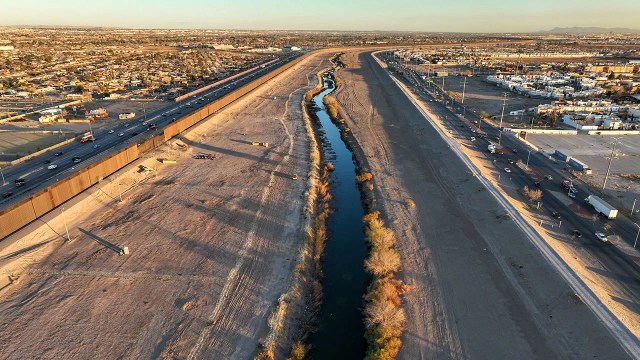
Pew Research Center conducted this study to understand the public’s views about the large number of migrants seeking to enter the U.S. at the border with Mexico. For this analysis, we surveyed 5,140 adults from Jan. 16-21, 2024. Everyone who took part in this survey is a member of the Center’s American Trends Panel (ATP), an online survey panel that is recruited through national, random sampling of residential addresses. This way nearly all U.S. adults have a chance of selection. The survey is weighted to be representative of the U.S. adult population by gender, race, ethnicity, partisan affiliation, education and other categories. Read more about the ATP’s methodology.
Here are the questions used for the report and its methodology.
The growing number of migrants seeking entry into the United States at its border with Mexico has strained government resources, divided Congress and emerged as a contentious issue in the 2024 presidential campaign.
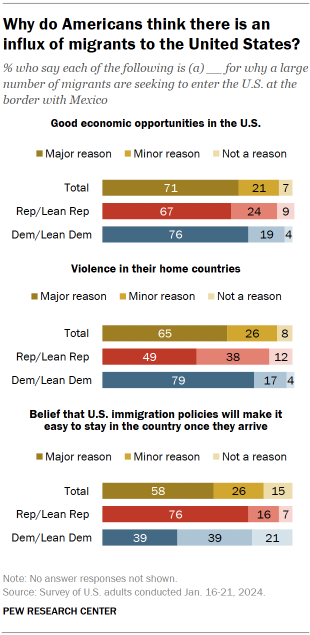
Americans overwhelmingly fault the government for how it has handled the migrant situation. Beyond that, however, there are deep differences – over why the migrants are coming to the U.S., proposals for addressing the situation, and even whether it should be described as a “crisis.”
Factors behind the migrant influx
Economic factors – either poor conditions in migrants’ home countries or better economic opportunities in the United States – are widely viewed as major reasons for the migrant influx.
About seven-in-ten Americans (71%), including majorities in both parties, cite better economic opportunities in the U.S. as a major reason.
There are wider partisan differences over other factors.
About two-thirds of Americans (65%) say violence in migrants’ home countries is a major reason for why a large number of immigrants have come to the border.
Democrats and Democratic-leaning independents are 30 percentage points more likely than Republicans and Republican leaners to cite this as a major reason (79% vs. 49%).
By contrast, 76% of Republicans say the belief that U.S. immigration policies will make it easy to stay in the country once they arrive is a major factor. About half as many Democrats (39%) say the same.
For more on Americans’ views of these and other reasons, visit Chapter 2.
How serious is the situation at the border?
A sizable majority of Americans (78%) say the large number of migrants seeking to enter this country at the U.S.-Mexico border is either a crisis (45%) or a major problem (32%), according to the Pew Research Center survey, conducted Jan. 16-21, 2024, among 5,140 adults.
Related: Migrant encounters at the U.S.-Mexico border hit a record high at the end of 2023.
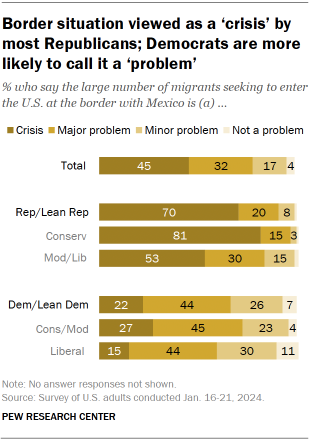
- Republicans are much more likely than Democrats to describe the situation as a “crisis”: 70% of Republicans say this, compared with just 22% of Democrats.
- Democrats mostly view the situation as a major problem (44%) or minor problem (26%) for the U.S. Very few Democrats (7%) say it is not a problem.
In an open-ended question, respondents voice their concerns about the migrant influx. They point to numerous issues, including worries about how the migrants are cared for and general problems with the immigration system.
Yet two concerns come up most frequently:
- 22% point to the economic burdens associated with the migrant influx, including the strains migrants place on social services and other government resources.
- 22% also cite security concerns. Many of these responses focus on crime (10%), terrorism (10%) and drugs (3%).
When asked specifically about the impact of the migrant influx on crime in the United States, a majority of Americans (57%) say the large number of migrants seeking to enter the country leads to more crime. Fewer (39%) say this does not have much of an impact on crime in this country.
Republicans (85%) overwhelmingly say the migrant surge leads to increased crime in the U.S. A far smaller share of Democrats (31%) say the same; 63% of Democrats instead say it does not have much of an impact.
Government widely criticized for its handling of migrant influx
For the past several years, the federal government has gotten low ratings for its handling of the situation at the U.S.-Mexico border. (Note: The wording of this question has been modified modestly to reflect circumstances at the time).
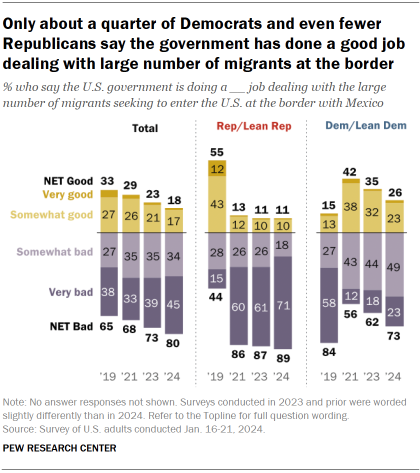
However, the current ratings are extraordinarily low.
Just 18% say the U.S. government is doing a good job dealing with the large number of migrants at the border, while 80% say it is doing a bad job, including 45% who say it is doing a very bad job.
- Republicans’ views are overwhelmingly negative (89% say it’s doing a bad job), as they have been since Joe Biden became president.
- 73% of Democrats also give the government negative ratings, the highest share recorded during Biden’s presidency.
For more on Americans’ evaluations of the situation, visit Chapter 1.
Which policies could improve the border situation?
There is no single policy proposal, among the nine included on the survey, that majorities of both Republicans and Democrats say would improve the situation at the U.S.-Mexico border. There are areas of relative agreement, however.
A 60% majority of Americans say that increasing the number of immigration judges and staff in order to make decisions on asylum more quickly would make the situation better. Only 11% say it would make things worse, while 14% think it would not make much difference.
Nearly as many (56%) say creating more opportunities for people to legally immigrate to the U.S. would make the situation better.
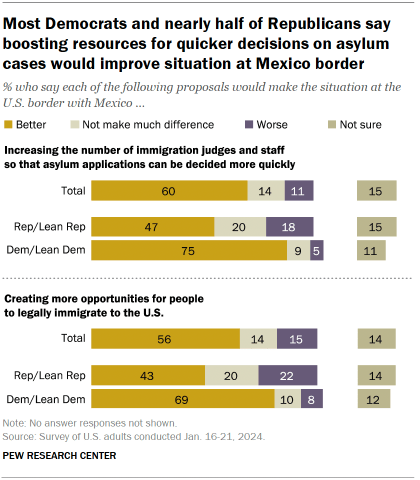
Majorities of Democrats say each of these proposals would make the border situation better.
Republicans are less positive than are Democrats; still, about 40% or more of Republicans say each would improve the situation, while far fewer say they would make things worse.
Opinions on other proposals are more polarized. For example, a 56% majority of Democrats say that adding resources to provide safe and sanitary conditions for migrants arriving in the U.S. would be a positive step forward.
Republicans not only are far less likely than Democrats to view this proposal positively, but far more say it would make the situation worse (43%) than better (17%).
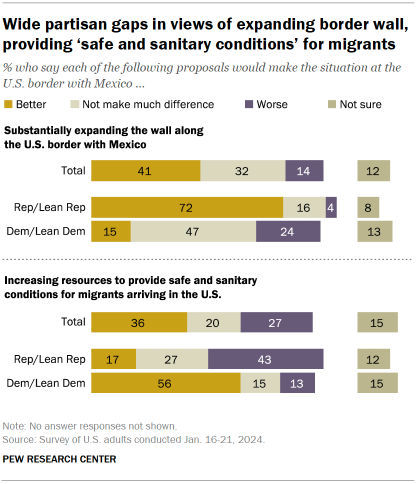
Building or expanding a wall along the U.S.-Mexico border was among the most divisive policies of Donald Trump’s presidency. In 2019, 82% of Republicans favored expanding the border wall, compared with just 6% of Democrats.
Today, 72% of Republicans say substantially expanding the wall along the U.S. border with Mexico would make the situation better. Just 15% of Democrats concur, with most saying either it would not make much of a difference (47%) or it would make things worse (24%).
For more on Americans’ reactions to policy proposals, visit Chapter 3.




